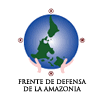Maria Aguinda's 20-Year Fight for Justice Continues as Chevron Refuses to Pay $19 Billion Judgment from Ecuador’s Courts

Amazon Defense Coalition
26 April 2013 - FOR IMMEDIATE RELEASE
Contact: Karen Hinton at +1.703.798.3109
Cambridge, MA – The 20-year fight by residents of Ecuador's Amazonian rain forest to make Chevron pay to clean up the contamination and polluted streams it left behind has made civil society stronger and Ecuador's courts better prepared to deal with similar cases in the future, a lawyer who was part of the case told students and faculty at Harvard.
Chris Jochnick now works in Washington with Oxfam America. He appeared this week with Andres Snaider, an attorney and litigation consultant who is helping a group of Ecuadorian residents who won a judgment in Ecuador in 2011 against Chevron for the giant oil company's substandard oil operations that left hundreds of pits filled with toxic chemicals and allowed the poisons to run into streams and rivers and pollute the soil.
Speaking at the Carr Center on Human Rights at Harvard's Kennedy School of Government, the two men focused on the people affected by the damage, where cancer deaths, birth defects and other serious health results were traced to Chevron's practices. Aguinda v. Chevron was filed on behalf of residents like Maria Aguinda, now a 63-year-old grandmother who speaks Qechua, and who saw two of her 10 children die and her grandchildren sickened by the pollution. "The company killed her culture; her people can't hunt and fish anymore," said Snaider, reading from a personal account she gave to a journalist last year. "She hoped filing the case would get her family some health care."
"When Texaco (later acquired by Chevron) came to Ecuador to drill in the 1960s, the military government was thrilled. The country had no respect for the Amazon jungle and its people. They allowed the company build roads, clear land, drill well and dump their waste with no oversight," said Jochnick. "The contamination of land and water was quite deliberate and it created havoc in the Amazon," he said.
"What's different today? Not enough. But now you have a strong civil society, a more engaged media and some laws" to protect citizens, plus a new respect there for indigenous people, said Jochnick.
Snaider noted that the original lawsuit was filed in New York immediately after Texaco had completed decades of contaminating oil operations, but that Texaco preferred to resolve the dispute in Ecuador where it had extensive support from the government. "They filed 14 affidavits from experts saying how fair Ecuador's courts were." He went on to explain that Chevron even went so far as to try to settle the matter directly with Ecuador's government at the time through a so-called remediation agreement, but the affected people were not parties to that settlement and the contamination was not cleaned up properly, as evidenced by scientific sampling that found high levels of contamination in the supposedly remediated sites.
Two years after the 2011 Ecuadorian court judgment for $19 billion against Chevron, the company refuses to pay and the oil pits and pollution remain unattended. The Ecuadorians have filed cases in Argentina, Brazil and Canada seeking to recognize the Ecuadorian judgment and attach Chevron's assets.
"When I first went down there I was focused on the government of Ecuador; they let this happen. The company operated with complete impunity," Jochnick said. But I came to recognize that the government was completely outmatched by the wealth and power of the oil industry, by the U.S. government and institutions like the World Bank and IMF – all pushing for quick development at any cost.
Snaider said that Chevron promised the 2nd U.S. Circuit Court of Appeals that it would abide by court rulings in Ecuador, when it successfully got the case moved out of the U.S. Eight years later when Chevron was found liable for intentional contamination in a carefully considered 188-page opinion in Ecuador, the oil company filed papers in the U.S. courts and with an arbitration panel in The Netherlands, trying to shift the liability to the government and avoid paying its debt.
"Chevron asked that the case be tried in Ecuador and had years to litigate there," said Snaider. "The record in the Ecuador trial is deep and wide and the court very carefully considered a huge number of arguments that Chevron made then and that it continues to make today." "There is a need to settle on a consistent and final path to justice in cases like this one," said Snaider. "If not, the huge financial and power disparities between the parties can allow disappointed litigants to just keep litigating and frustrate efforts to achieve justice," he said.